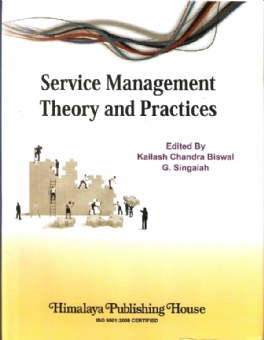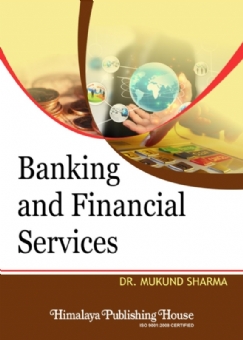This book is a collection of selected papers presented at the National Seminar, 2014 on the “Emerging Trends of Financial Services in India”. The book could not have been brought out without the support, cooperation and encouragement of several people and it is difficult for us to acknowledge their help and support individually.
The objective of seminar was to discuss and debate on the various trends of service management, e.g., Banking, Insurance, Tourism, Hospitality, Marketing Services and Financial Services, e.g., reforms, crisis, convergence, financial engineering and financial inclusion which are the five recent trends in the financial services in India. The proposed seminar have been a forum for bringing together academia, research scholars and experts, to identify the opportunities for the development of new financial market instruments, financial services and discuss ways to move forward to develop and introduce such instruments, and in general to broaden and deepen financial services. Since liberalization, financial services have undergone tremendous change and has been evolving into anew and vibrant system. As an important segment of the financial sector, it plays a significant role in mobilizing savings and channelizing them for productive purposes. The basic motivation for the sea change in the Indian financial services during the recent past can be attributed to the series of efforts made by the Government of India. As a part of financial sector reforms, a large number of initiatives have been taken to restructure the banking and insurance sector and a series of direct reforms have been brought out in Indian financial services. The growth in the number of intermediaries in the capital market such as merchant banker’s underwriters, custodians and share transfer agents, the establishment and progress of rating agencies for evaluating debt being floated in money and capital markets has added necessary new dimension on professional quality of market making. Indian financial market has also been opened up to the foreign institutional investors (FIIs) like pension funds, hedge funds, insurance funds, investment companies and management outfits. Establishment of the national stocks exchange with its screen-based trading helped improving the transparency in stock’s operations. Trading periods are enhanced and settlement cycles are reduced ‘options’, ‘forward’ and ‘futures’ on stocks are being introduced. The establishment of Securities and Exchange Board of India (SEBI) is one of the landmarks in the regulation of capital markets in India. These developments have not only given a new shape but also new yields in both capital and money markets as well as service market in India.
Contents –
SECTION I: SERVICE SECTOR, HR AND MARKETING
1. Ethics in the Service Industry – Prof. Biswajit Satpathy
2. Consumer Satisfaction: A Study on Mobile Users in South Odisha – Dr. Gouri S. Lall
3. A Study on Impact of Perceived Service Quality and Customer Retention Programme on Customer Satisfaction in DTH Sector – Mr. Debasis Pani and Dr. Sunil Kumar Pradhan
4. Service Oriented Strategic Marketing – Dr. Bhaskar Bandyopadhyay
5. Anadhra Pradesh Tourism Development Corporation – An Overview – Mr. Thrinadha Rao Bandaru
6. Measuring Service Quality of the Hotel Industry: A Case Study – Dr. Saumendra Das
7. Effect of Performance Management System on Employee Performance: A Study in Vizag Steel Plant – Ms. Archana Bhagat and Ms. Kalpana Sahoo
SECTION II: BANKING AND INSURANCE
8. Transformation of Indian Life Insurance Sector After Globalization: Role of Foreign Direct Insurance Bills and Private Players – Dr. Suman Kalyan Chudhury and Dr. Sukanta Sarkar
9. SWOT Analysis of Traditional Weekly market Network System in North East: Need For Linear Progression – Prof. G. Singaiah
10. Managing Functional Areas of Small Enterprises: North East Perspective – Prof. G. Singaiah and Dr. B. Hazarika
11. Excellence in Service: A Review on E-Banking and E-Age Technologies – Dr. Saumendra Das and Prof. Prasanta Kumar Padhy
12. Investigationg Customer Satisfaction in Banking Industry: A Comparative Market Survey in India – Dr. Uma Sankar Mishra
SECTION III: FINANCIAL INCLUSION
13. Microfinance: A Promising Possibility For Financial Inclusion In Rural Odisha – Ms. Progyanrani Behera and Dr. Amita Kumari Choudhury
14. Does MFIS are in Real Development of Women Self Help Groups?: An Analytical Study of Odisha – Dr. Sushil Kumar Pattanaik
15. Green Economy: A Global View – Mr. Biswa Mohana Jena and Dr. Sanjay Kumar Satapathy
16. Agriculture Scenario (Goods and Services) in North East India Accentuate on Meghalaya and Bangladesh – Ms. Himadri Das and Ms. Yoowanka Lyngdoh
17. Establishing IFSC (International Financial Service Centre) A Milestone in Harnessing ‘Make in India’ Opportunity – Mr. Nitin Shanakar, Dr. Suresh Kumar Sahoo and Dr. Amit Kumar Sinha
18. Performance of Meghalaya Cooperative Apex Bank Limited: A Diagnostic Study – Dr. Mriganka Chakraborty, Mr. Mridul Chanda and Mridul Barman
19. Impact of Information Technology on Banking Sector: A Study Mr. Chinmaya Sahu, – Dr. Bhanu Prasad Behera and Dr. Bhaskar Bandyopadhyay
SECTION IV: CAPITAL MARKET AND STOCK MARKET
20. Factors Affecting Divident Policy: A Study on Selected Indian Automobile Companies – Dr. K.C. Biswal and Mr. Dhananjoy Narzary
21. Working Capital Management of Cement Manufacturing Company Limited (CMCL) of Meghalaya: An Empirical Study – Ms. Yoowanka B. Lyngdoh







